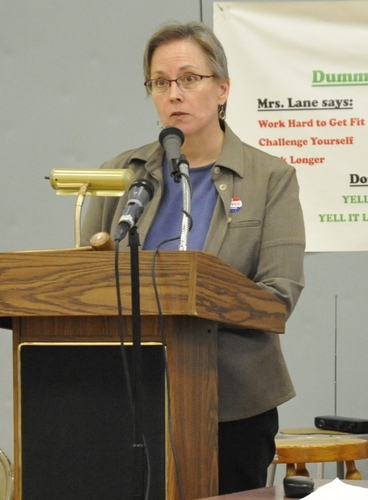DUMMERSTON — One of the more contentious items on the Town Meeting warrant each year is the article that allocates town money for area social services agencies ranging from Morningside Shelter and the Brattleboro Area Drop-In Center, to the Women's Freedom Center and Brattleboro Area Hospice.
At this year's Town Meeting on March 3, voters considered an $875 increase for fiscal year 2016, from $10,350 to $11,225. It passed narrowly, 66 to 39.
While a relatively modest increase, this motion was made weightier in light of a recent calculation by the Social Services Committee, which showed Dummerston, by almost every measure, spending less on social services than any other similar town in the area.
Nearly an hour of debate revealed that, for some, the increase represented a correction to a glaring and embarrassing shortcoming, while others felt it would be a new strain on an already heavy tax burden.
On each chair of the Dummerston School Gym was a blue leaflet of information compiled by the Social Services Committee which, among other things, said of the issue, simply, “We're not doing our share.”
Town Moderator Cindy Jerome, who recused herself for this issue as she also serves as the chair of the Social Services Advisory Committee, spoke of the careful research and consideration that went into the proposal.
Compared with six other towns, Guilford, Marlboro, Newfane, Putney, Townshend and Westminster, Dummerston came in last, with the sixth place town - Townshend - contributing almost twice as much as Dummerston taxpayers.
Based on the 2010 U.S. Census numbers, Dummerston, with a population of 1,864, appropriated $5.55 per capita. Townshend, with a population of 1,232, appropriated $10.48 per capita.
Newfane was the most generous of the seven towns. With a population of 1,726, it gave $16.31 per capita, or $28,150. Putney, the largest of the seven towns with 2,702 inhabitants, gave the most, $38,123, or $14.11 per capita.
Jerome said of the findings of her committee's research, “It became embarrassing to see that, over and over again, Dummerston was just not doing its part.”
Former Selectboard member Tom Bodett, who spoke in favor of the motion, echoed this sentiment.
“We are drafting behind the generosity of people just like us, people who are struggling economically, people in all seven towns,” he said. “Any one of us in this room or people we love could end up needing the services of these agencies and I think we should do our part.”
One voter, however, spoke on how even comparatively small tax increases are difficult for those who are struggling economically.
“People are living on a shoestring,” said resident Mark Whittaker. “Find other avenues to raise this money.”
Whittaker said that “103 people signed the petition [to get the article on the agenda] and I ask that you 103 people go home tonight, open up that checkbook, and you write that check for $8.50...and you find $850 without putting any more burden on the taxpayer.”
He was not the only one to speak to the idea of individual responsibility, and not public responsibility, to support these services.
“I think personally, if we want to give charity, we should open our checkbook.ۥ I don't think we should be giving out town money,” said a different voter, who also expressed a wariness of spending money on services that might be wasteful of taxpayer money or do not directly serve Dummerstonians.
After long debate, in which the questions of why “should we compare ourselves to our neighbors” as one speaker put it, and whether or not taxpayers have a responsibility to be better than “the seventh name on the roster,” the article was put to a vote.
“Our budget stops at our town boundaries -ۥ our communities do not, our responsibilities do not,” said Bodett. which seemed to be the prevailing feeling, as, after a paper ballot vote, the article passed.
